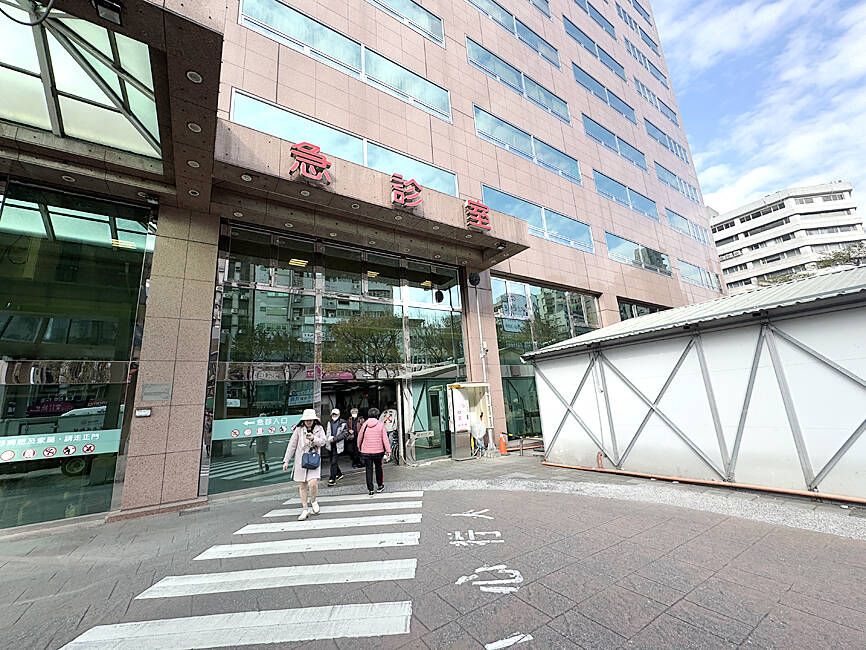Mackay Memorial Hospital in Taipei yesterday said it is investigating claims that 16.6 million documents containing patient data were leaked, urging people to be aware of online scams.
The leaked data appear to be medical records, but authorities have yet to confirm if they are from Mackay, said Lee Chien-chang (李建璋), director of the Ministry of Health and Welfare’s Department of Information Management.
Unlike similar situations abroad, the attack did not interrupt the hospital’s ability to care for patients, Lee said.

Photo: Chiu Chih-jou, Taipei Times
However, hackers encrypted and stole data at the same time, Lee added.
After the Mackay Memorial Hospital cyberattack early last month, Changhua Christian Hospital was also attacked using the same “Crazy Hunter” software.
Following this, the Ministry of Health and Welfare put together Taiwan’s first guidelines on standard operating procedures for hospitals to respond to ransomware attacks.
In response to the claims that hackers are seeking to sell documents allegedly related to the ransomware attacks, Mackay Memorial Hospital yesterday released a statement addressing the situation.
First, the hospital follows a zero-trust cybersecurity model and alerted relevant authorities at the health ministry as well as the Investigation Bureau, it said.
It is cooperating with experts, and as this is an active investigation, it can no longer provide comment, it added.
The hospital warned the public about potential scams stemming from the incident, reminding people to not follow instructions about ATM transfers or provide any personal information over the phone.
People who suspect scam attempts should contact the government’s 165 anti-fraud hotline, and concerned people can call the hospital’s cybersecurity hotline at (02) 2543-3535 extension 3564, it said.
The hospital also said it would continue to improve its cybersecurity through system updates and employee training, adding that it remains committed to providing high-quality care to patients.

Alain Robert, known as the "French Spider-Man," praised Alex Honnold as exceptionally well-prepared after the US climber completed a free solo ascent of Taipei 101 yesterday. Robert said Honnold's ascent of the 508m-tall skyscraper in just more than one-and-a-half hours without using safety ropes or equipment was a remarkable achievement. "This is my life," he said in an interview conducted in French, adding that he liked the feeling of being "on the edge of danger." The 63-year-old Frenchman climbed Taipei 101 using ropes in December 2004, taking about four hours to reach the top. On a one-to-10 scale of difficulty, Robert said Taipei 101

Nipah virus infection is to be officially listed as a category 5 notifiable infectious disease in Taiwan in March, while clinical treatment guidelines are being formulated, the Centers for Disease Control (CDC) said yesterday. With Nipah infections being reported in other countries and considering its relatively high fatality rate, the centers on Jan. 16 announced that it would be listed as a notifiable infectious disease to bolster the nation’s systematic early warning system and increase public awareness, the CDC said. Bangladesh reported four fatal cases last year in separate districts, with three linked to raw date palm sap consumption, CDC Epidemic Intelligence

US climber Alex Honnold left Taiwan this morning a day after completing a free-solo ascent of Taipei 101, a feat that drew cheers from onlookers and gained widespread international attention. Honnold yesterday scaled the 101-story skyscraper without a rope or safety harness. The climb — the highest urban free-solo ascent ever attempted — took just more than 90 minutes and was streamed live on Netflix. It was covered by major international news outlets including CNN, the New York Times, the Guardian and the Wall Street Journal. As Honnold prepared to leave Taiwan today, he attracted a crowd when he and his wife, Sanni,

Taiwanese and US defense groups are collaborating to introduce deployable, semi-autonomous manufacturing systems for drones and components in a boost to the nation’s supply chain resilience. Taiwan’s G-Tech Optroelectronics Corp subsidiary GTOC and the US’ Aerkomm Inc on Friday announced an agreement with fellow US-based Firestorm Lab to adopt the latter’s xCell, a technology featuring 3D printers fitted in 6.1m container units. The systems enable aerial platforms and parts to be produced in high volumes from dispersed nodes capable of rapid redeployment, to minimize the risk of enemy strikes and to meet field requirements, they said. Firestorm chief technology officer Ian Muceus said